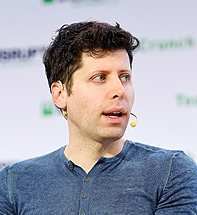The price surged 100 times, with a valuation comparable to OpenAI, but Sam Altman's Worldcoin is facing its biggest crisis
Original Title: Soaring 100 Times, Valuation Comparable to OpenAI, Sam Altman's Worldcoin Faces Its Biggest Crisis
Original Author: Xin Xin, Geek Park
Original Editor: Jing Yu, Geek Park
In the bustling city center of Hong Kong, and in the underdeveloped villages of Kenya and Cambodia, you can see people lining up, bringing their eyes close to a spherical object to scan their irises, and receiving an account and dozens of dollars as "compensation" afterward.
This is not a public cataract screening by the International Red Cross, nor an episode of "Black Mirror," but the work site of Worldcoin, a cryptocurrency project co-founded by OpenAI founder Sam Altman.
The Worldcoin project is undoubtedly Sam Altman's bolder bet, a global biometric identity network with the vision of providing basic income and aiming to reshape the world's financial system.
From developing countries to developed nations, operators of Worldcoin's iris scanning device (Orb) are conducting ground promotions worldwide, capturing iris scan data through a spherical "Black Mirror"-like device, spreading the crypto-utopian ideology of Worldcoin like missionaries.
Just a month ago, Worldcoin's token WLD was listed on several cryptocurrency exchanges, with the price peaking at $4.7, an increase of over 1000%. If calculated based on fully diluted valuation, the Worldcoin project is valued at $28 billion—comparable to OpenAI's current valuation.
In 2019, OpenAI CEO Sam Altman and others co-founded Worldcoin. Three years later, according to Worldcoin data, over 2 million people from more than thirty countries have registered for World ID. The company also stated that it has begun to accelerate the global distribution of Orbs, hoping to increase the number of scanning devices to 1,500 this year to promote adoption.
However, in this process, Worldcoin has been mired in endless doubts and criticisms:
- Fake accounts
- Application bugs
- Unprofessional staff
- Data leaks
- Regulatory scrutiny
- Unclear direction
In the face of these doubts, Sam Altman, as a co-founder of Worldcoin, admitted that he and the team are also unclear about what will happen to the project's future.
Trouble 1: Inability to Recognize Asian Eyes
Worldcoin's iris scanning device Orb has been reported to encounter problems when scanning the eyes of Asians.
"Open your eyes." According to Forbes, an Asian American executive at Tools For Humanity (Worldcoin's developer) repeatedly received this prompt while trying to complete an eye scan, causing laughter among colleagues.
Internal staff indicated that the spherical device sometimes struggled to scan the eyes of other Asian employees. They also pointed out that in the early stages, the device frequently malfunctioned.
A former Worldcoin employee attributed the difficulty in scanning Asian eyes to a lack of diverse training data, noting that the system was primarily trained on the eyes of white and black individuals.
Tools For Humanity declined to comment specifically on the incident involving the executive, but communications director Rebecca Haan stated in a statement that the device demonstrated "global inclusivity" during field tests, scanning "a diverse population covering five continents, including Asia," with "over two million" scans.
Trouble 2: Fake Account Registrations
Among the over 2 million registered World ID users, many come from developing countries, including Kenya, where the Worldcoin project's World App mobile application once became the most downloaded app.

However, last year, Worldcoin experienced a vulnerability that allowed Orb operators to deceive the device into creating multiple registered accounts for the same person. Since more registrations could yield higher commission rewards, this practice was frequently used in Kenya, with some exploiting the loophole to create around 100 registered accounts for themselves.
Now, how many registered accounts are fake has become a question. According to former Worldcoin employees, some within the company believe this is a "crisis," as such a situation could undermine the company's entire vision, making it impossible to prove that a person is a unique individual.
The legal director of Tools For Humanity stated in a statement that the company and the Worldcoin Foundation "are investigating allegations of potential fraud or operational misconduct and will take corrective actions as necessary." These measures include the dismissal of some operational personnel and staff. The company has also released software updates to address the vulnerabilities.
The founder of Ethereum believes it is difficult to verify whether there are vulnerabilities in the construction of the Orb device, leaving room for potential backdoors. "Even if the software layer is perfect and fully decentralized, the Worldcoin Foundation still has the ability to insert backdoors into the system, allowing it to create an arbitrary number of fake human identities." He also expressed concerns about the possibility of creating 3D-printed "dummies" to obtain World IDs through iris scans.
Trouble 3: Application Bugs
In late July this year, the Worldcoin application was officially launched, but the rollout has not been smooth.
Some who underwent iris scans reported being unable to claim their tokens. According to an operator in Kenya, they received hundreds of complaints, and Worldcoin representatives did not respond through customer service channels.
The mobile application also experienced downtime, with users facing difficulties logging into the World App to access their crypto wallets. Login attempts encountered various error messages, including "Network Error: Rate Limit Exceeded," "Backup Not Found," and "Returning Soon."
The support team for World App confirmed this situation on X (formerly Twitter), stating that the mobile application "experienced higher traffic than usual" and requested users to "try again later" if they encountered any issues.
Alex Blania, CEO of Tools For Humanity, responded in a statement that the deadline for users to claim their tokens has been extended, noting that "system and technical strains, along with intermittent delays, occurred due to a surge in global demand and a complex transition to production systems," and that "the project has taken measures to ensure that the technical challenges encountered at launch do not negatively impact the earliest Worldcoin users."
Trouble 4: Exploiting People in Poor Countries
Since the launch of the scanning devices, people from over thirty countries have participated, with most registered users coming from South Africa, India, and Europe. Although the company was founded in the United States, the Worldcoin project was not initially available to U.S. citizens due to regulatory issues.
The Worldcoin project offers people free Worldcoin tokens WLD in exchange for their iris scan data. In addition to the tokens, users also receive a World ID, proving they are human and not AI, which serves as a global digital ID that can be used to verify identity to third parties without sharing any other personal information.
However, critics have likened it to a brand of Silicon Valley colonialism. They argue that this startup promises to provide cryptocurrency-based inclusive basic income, but much of what it does currently is merely establishing a biometric database from impoverished populations.

MIT Technology Review has published allegations that Worldcoin exploits low-income countries in Africa and Asia, including Kenya, collecting biometric data from people with little knowledge of Worldcoin in "places without money and legal protection."
An article from the crypto platform BlockBeats claims that people in Cambodia and Kenya sell their iris data to speculators on the black market for $30, hoping the value of the WLD tokens they receive from the scans will rise.
In developing countries like Kenya, operators of the iris scanning devices are compensated on a commission basis, hiring locals to scan irises. Ground promotion personnel are reportedly using deceptive marketing tactics, collecting personal data beyond what they acknowledge, and failing to obtain valid informed consent, with many local residents participating in eye scanning activities without understanding. Sometimes even local representatives and officials cannot answer basic questions about Worldcoin.
In response to these allegations, Worldcoin stated that it is also operating in developed countries, including some European nations.
Trouble 5: "Stupid Behavior" of Device Operators
To acquire more registered users, the company encourages device operators to subcontract their iris scanning activities to capture more irises, obtaining more Orb scanning devices through a weekly quota mechanism and earning more commissions. However, some operators have been arrested, exploited, or harassed by local law enforcement and community members.
In Norway, some device operators reportedly focused on the 16 to 25 age group, leveraging young people's "peer pressure" to promote Worldcoin among the youth. In other regions, operators have allegedly scanned underage users. Additionally, operators may provide kickbacks to local government leaders during registration activities. Alternatively, the regions themselves may prohibit cryptocurrency-related activities, which means violating local laws.
Co-founder Alex Blania reportedly lamented that iris scanning device operators in some places "have started doing some very, very stupid things," and "this was to be expected."
A team spokesperson also stated that device operators "are independent contractors, not employees of Worldcoin." They need to apply, undergo interviews, and receive approval to earn commissions based on the biometric data collected, and they must "comply with local laws and regulations, including local labor laws."
Trouble 6: Data Security and Regulation
Sam Altman stated: "Worldcoin could significantly increase economic opportunities, providing a reliable solution for distinguishing humans from AI online while protecting privacy."
However, as a private organization, the intent of the Worldcoin project to capture global human iris data has attracted the attention of regulators worldwide. Due to concerns about data privacy, regions such as Kenya, France, the UK, and Germany have conducted regulatory reviews of the project.
The Kenyan government suspended Worldcoin's operations in the country due to data protection issues, launching an investigation to assess the "authenticity" and "legitimacy" of the project in this East African nation. France's privacy regulatory agency has also initiated an investigation, questioning "the legality of this data collection seems to be in doubt, as do the conditions for storing biometric data." Additionally, data regulatory agencies in the UK and Germany have also launched investigations into the project.

Are the benefits of the iris scanning authentication system worth the privacy risks? Some venture capitalists believe "it's not a good idea to have a group of people hand over their biometric data to a non-government entity." If the project leaders are corrupt, it could lead to dangerous consequences.
In March of this year, hackers reportedly stole some Orb operators' security credentials, gaining full access to the Worldcoin Orb operator dashboard. Two months later, leaked hashes of iris scans began appearing on the dark web, allegedly priced as low as $20.
A Worldcoin spokesperson stated that the internal investigation concluded that "no sensitive or personal user data was leaked." No sensitive data can be accessed by Orb operators, and any biometric data is encrypted. The company has also reset all Worldcoin operators' logins out of caution and expedited the rollout of two-factor authentication for the Worldcoin operator application.
"It is important to emphasize that we do not collect data to profit from or monitor our users, unlike many other tech companies. Instead, our goal is to improve the lives of billions of people through digital identity," Worldcoin stated in a press release.
However, the history of Silicon Valley companies handling data has left a negative impression, and there are concerns that iris scans could be used for surveillance or sold to third parties. Edward Snowden has also commented on Altman's posts about Worldcoin, saying, "Do not use biometrics for anything; the human body is not a ticket."
Worldcoin responded that the project "will never sell any user personal data," will continue to cooperate with governments, will comply with all laws and regulations regarding personal data processing, and will continue to cooperate with government agencies on information requests regarding its privacy and data protection practices.
According to Worldcoin, iris scan data will be processed and stored in the Orb's local memory, and unless specified otherwise by the owner, it will subsequently be deleted, or at least deleted after the company completes training its AI neural network to recognize irises and detect fraud. The processed personal data on the Orb has been encrypted and uploaded to Worldcoin's blockchain-based digital identity network.
UK regulators have mentioned that consent for processing biometric data "must be given voluntarily and can be withdrawn without detriment." However, since Worldcoin's data is based on blockchain, there are no options for deletion and withdrawal.
Trouble 7: Questions of Fairness
There are also doubts about the fairness claimed by Worldcoin. It is reported that about 20% of the tokens have already been distributed: about 10% to Worldcoin's full-time employees and another 10% to investors.
Moreover, Worldcoin relies on specialized hardware, which poses a "hardware centralization" issue. One risk here is that if an Orb manufacturer is malicious or hacked, it could generate an unlimited number of fake iris scan hash values and assign them World IDs.
To make the system more resilient against malicious Orb manufacturers, the Worldcoin team proposed regular audits of the Orbs to verify whether they are built to specifications, whether key hardware components are built to specifications, and whether they have been tampered with afterward. This is a challenging task.
Additionally, considering the connection between Tools for Humanity and the founder of the now-bankrupt cryptocurrency exchange FTX, Worldcoin's credibility is also in question. FTX founder Bankman-Fried supported the project with a $25 million Series A investment in 2021, later facing 12 criminal charges, including fraud and money laundering. Furthermore, the reportedly bankrupt Singaporean crypto hedge fund Three Arrows Capital also participated in Worldcoin's early financing.
The total supply of Worldcoin tokens is limited to 10 billion over the next 15 years, with only 14.3 million tokens available at the launch of the global scanning project. According to Coinbase data, the market capitalization of Worldcoin tokens is currently about $220 million, halving from the peak price of $512 million on the day of the token's issuance on July 24.
Trouble 8: Unclear Development Direction
Co-founder Alex Blania stated in a statement: "Worldcoin has been established for over three years, aiming to create a new privacy-preserving identity and financial network owned by everyone." They see themselves at the forefront of driving innovation, aiming to bring cryptocurrency into the mainstream and pave the way for a global basic income system in the future.
Sam Altman is also leveraging the reputation he gained from OpenAI to promote Worldcoin and Orb. He has posted photos of himself scanning irises in Europe and shared videos on X (formerly Twitter) showing long lines outside Orb scanning sites, claiming the project scans a new user every 8 seconds.

According to co-founder Alex Blania, in the second week after Worldcoin's official launch, there were about 14,000 Orb verifications daily, with World App having 1.7 million monthly active users, and it topped the app stores in several countries, "from Tokyo to Buenos Aires, people lined up (sometimes over 1,000 people)."
However, Sam Altman himself seems unable to determine what Worldcoin will ultimately become. He once said at a summit, "We seem to not have fully figured this out yet. That's okay—it's hard, and it's really new. Once we internally decide on the direction we want to go—there are still multiple opinions—once it's articulated, if it really resonates with people, then things will really take off."
"I don't know what the situation with Worldcoin will be like; I think none of us do. But if there is a single global platform infrastructure—whatever form it ultimately takes—with half of the world's population using it, and everyone agrees it is a store of value, I am very confident that if we can build this platform layer, the creativity of the world will surprise us positively," Sam Altman said.
The global implementation of universal basic income is still "a long way off." Sam Altman does not have a clear idea of which entity can allocate funds, but he believes Worldcoin may lay the groundwork for achieving this goal.
Currently, the potential applications of the Worldcoin verification system include financial transactions, voting, airdropping cryptocurrencies, remittances, and website logins. The core value is primarily the ability to prove a person's identity, freeing it from old forms of identification like passports. If successful, this protocol could become a universal authentication method for a new generation of the internet. Sam Altman stated, "Worldcoin can achieve this globally without government permission, which is indeed exciting."
Additionally, Alex Blania reportedly mentioned in a company meeting that Worldcoin's reshaping of the financial system "could lead to the collapse of nations." Sam Altman stated that his operational principle is "to scale and see what happens," and he believes "this is very valuable."
Sam Altman also welcomes critical questions, believing that "haters" give his team energy, "maybe it will succeed, maybe it won't, but trying such things is what makes progress possible."














